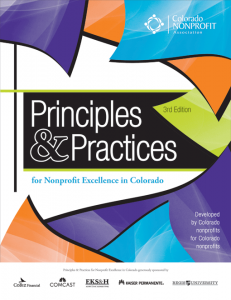This is the third post in a series about Colorado nonprofit corporate issues. Click here for last week’s post on membership issues, and here for the earlier post on proxy voting. Check back in coming weeks for posts on other topics including email voting, parliamentary rules, and recommended corporate policies.
For nonprofit corporations, the articles of incorporation and bylaws are both key corporate documents. However, there can be confusion about the difference between the two, and the different purposes they serve. We’ll go over the high points of each here, and give some recommendations on structuring.
Articles of Incorporation. The articles of incorporation establish a framework for the organization’s operation. They should include key information like the organization’s name; exempt purpose; distribution of assets upon dissolution; whether the organization will have voting members; and limited liability for directors (there is a specific limitation that under Colorado law must go in the articles to be effective). The articles may, but do not need to, set forth the names and addresses of initial directors. For 501(c)(3) organizations, federal tax law requires certain provisions regarding charitable purpose and dissolution to be in the articles, as well.
Currently in Colorado, the process to incorporate is done online on the Secretary of State’s website, with some information being entered into an online form and other information addressed in a separate attachment.
Bylaws. The bylaws are the internal governing document for the corporation, and establish rules for day-to-day management of the organization. They should generally address issues such as:
- Director selection, terms and removal/resignation
- Membership requirements and structure
- Meeting-related information, including notice and requirements for written action
- Officer duties, terms and removal/resignation
- Committee structure
- Indemnification of officers, directors and members
- Availability of records.
There is no requirement that the bylaws be filed with the Secretary of State or otherwise made publicly available.
Remember Hierarchy. The Colorado Revised Nonprofit Corporation Act is the top of the governance chain, and no provisions in the articles or the bylaws can conflict with any of its requirements. After the statutes come the articles of incorporation, and then the bylaws. This means that if there are any inconsistencies between the articles and the bylaws, the articles will trump.
Avoid Duplication. It’s best to avoid repeating information and provisions in both the articles and bylaws, because often one will get updated but not the other. This can lead to confusion for nonprofit leadership and staff. What’s worse, if the bylaws are updated but not the articles and the nonprofit is going off the latest bylaw provision for something like director election, it actually opens itself up to claims that it isn’t taking valid corporate action (because the older provision in the articles technically would prevail). Because of this, it can be better to keep the articles rather lean with just essentials, and cover the remaining governance issues in the bylaws.
Consider Default Rules. The Colorado statutes handle many issues by default rule. This means that, unless the corporation chooses otherwise through its articles or bylaws, it must abide by the statutory provisions. Once such default rule is proxy voting, discussed in our prior post. The default rule for directors is that proxy voting is not allowed, unless the bylaws provide otherwise. Some organizations opt to utilize the default rules as much as possible and not cover many issues in their bylaws, which helps keep them lean. Other organizations, even if going with the default rules, still like to include the language in the bylaws so that all issues are covered in one place. This is a judgment call and a matter of personal preference for organizations.


